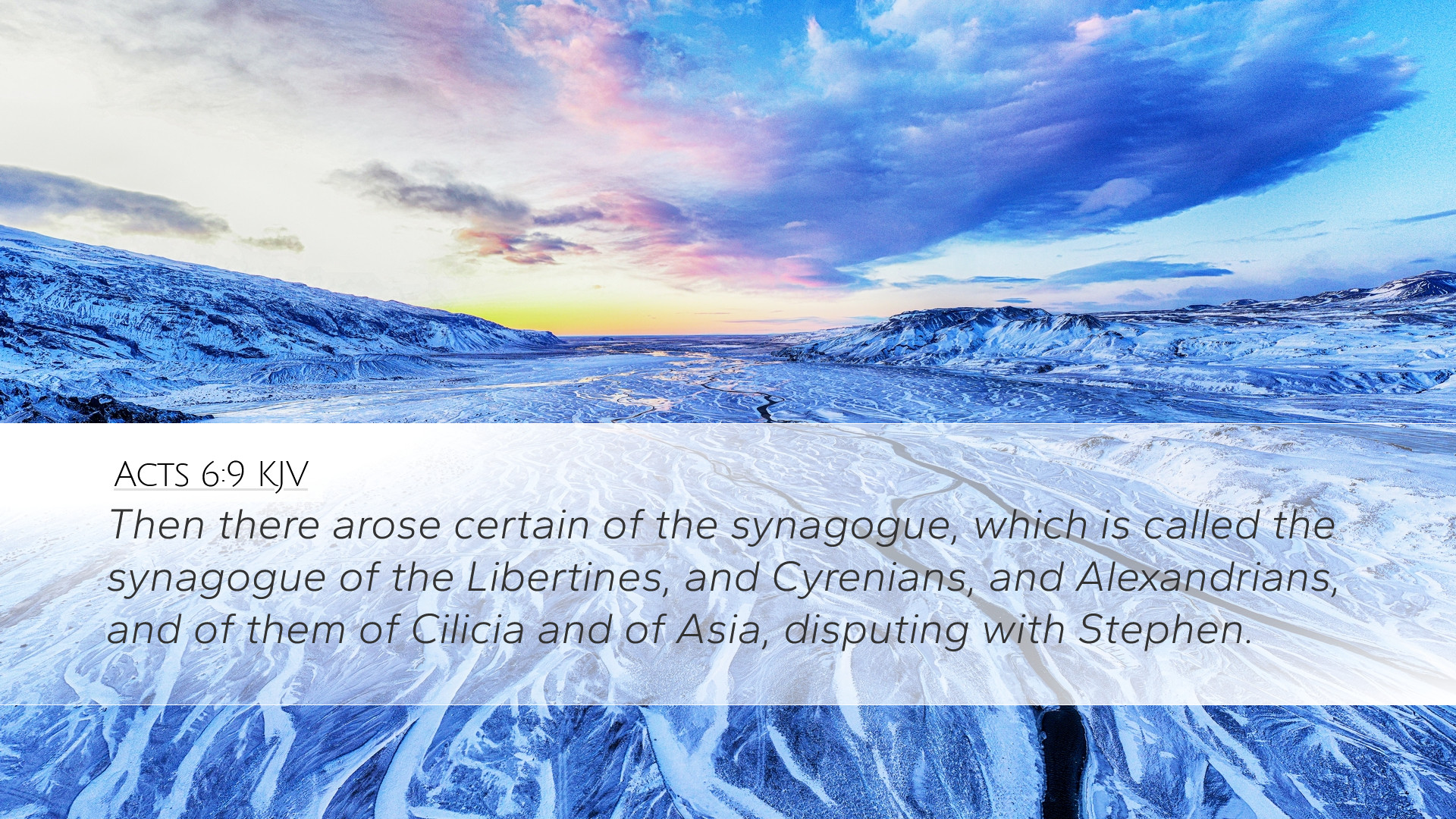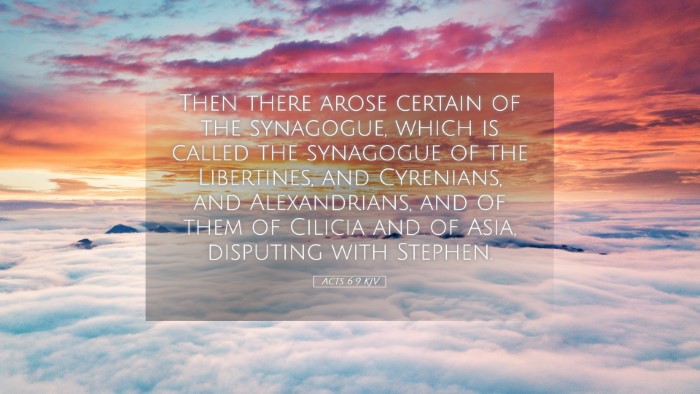Old Testament
Genesis Exodus Leviticus Numbers Deuteronomy Joshua Judges Ruth 1 Samuel 2 Samuel 1 Kings 2 Kings 1 Chronicles 2 Chronicles Ezra Nehemiah Esther Job Psalms Proverbs Ecclesiastes Song of Solomon Isaiah Jeremiah Lamentations Ezekiel Daniel Hosea Joel Amos Obadiah Jonah Micah Nahum Habakkuk Zephaniah Haggai Zechariah MalachiActs 6:9
Acts 6:9 KJV
Then there arose certain of the synagogue, which is called the synagogue of the Libertines, and Cyrenians, and Alexandrians, and of them of Cilicia and of Asia, disputing with Stephen.
Acts 6:9 Bible Commentary
Commentary on Acts 6:9
Verse Text: "Then there arose some of the synagogue which is called the synagogue of the Libertines, and Cyrenians, and Alexandrians, and of them of Cilicia and Asia, disputing with Stephen."
Introduction
The events surrounding the early church and the rising tensions are pivotal to understanding the development of Christian doctrine and the missionary movement. Acts 6:9 marks a significant moment in the ministry of Stephen, the first Christian martyr, revealing the challenges faced by the apostles and the spread of Gospel during a time of intense Jewish opposition.
Contextual Analysis
To grasp the significance of this verse, we must consider the context in which it occurs. Stephen, one of the seven chosen to serve the needs of the church (Acts 6:1-6), was filled with faith and the Holy Spirit, performing wonders and signs among the people. This stirred various sects within the Jewish community, particularly those represented in the synagogue mentioned in our verse.
Commentary Insights
Synagogue of the Libertines
Matthew Henry notes that the term "Libertines" could refer to Jews who had gained their freedom from slavery or those who had been freed from exile. This indicates a diverse group suggesting social and political complexities within the Jewish population. Stephen's engagement with them reflects the kind of deep-seated issues that plagued the Jewish community regarding Roman oppression and personal identity.
Geographical Significance
- Cyrenians: Originating from Libya in North Africa, they were likely among those converted in Jerusalem.
- Alexandrians: Alexandria, a hub of culture and learning, housed many Jews, indicating Stephen’s reach and the comprehensive nature of the debates.
- Cilicians and Asiatics: Their presence shows the diversity of settlers and the global Jewish diaspora, making the synagogue a melting pot of different cultural and theological perspectives.
Disputing with Stephen
Albert Barnes comments on the intensity of the disputes. The term "disputing" conveys a sense of vigorous debate, highlighting Stephen's intellectual capability in defending Christianity against traditional Judaism. This confrontation signifies the shifting dynamics within the early church and Jewish establishments, exemplifying the clash between the nascent Christian faith and established religious authorities.
Theological Implications
In Adam Clarke's interpretation, this verse illustrates the broader theological conflict arising from the introduction of the Gospel message to the established religious order. As noted, the "disputing" highlights both Stephen's role as a witness and the reality of opposition that would mark the early church's mission. Clarke emphasizes that the trial of faith was more than personal challenges; it represented a cosmic battle between light and darkness, truth and deception.
Evaluating the Opposition
This opposition against Stephen represents a microcosm of the larger struggle of the early church. As the message spread, it often encountered vehement resistance. The description of the synagogue of libertines illustrates a structured opposition, implying that Stephen confronted various philosophical and theological worldviews, thereby initiating theological debates essential to the Christian faith's foundation.
Application for Today
For pastors, theologians, and students, Acts 6:9 serves as a reminder of the importance of engaged dialogue when presenting the Gospel. It encourages readiness to address opposing views and utilize the truths of Scripture effectively. Understanding the backdrop of these disputes can enrich one’s approach to contemporary challenges in sharing the faith.
Conclusion
The events encapsulated in Acts 6:9 not only highlight the growing pains of the early church but also illuminate the model of debate that believers may follow. In a world posturing against the truth of the Gospel, Stephen serves as a powerful example of steadfastness and faithfulness in witness, serving as a call for all believers to stand firm in their faith amidst opposition.


